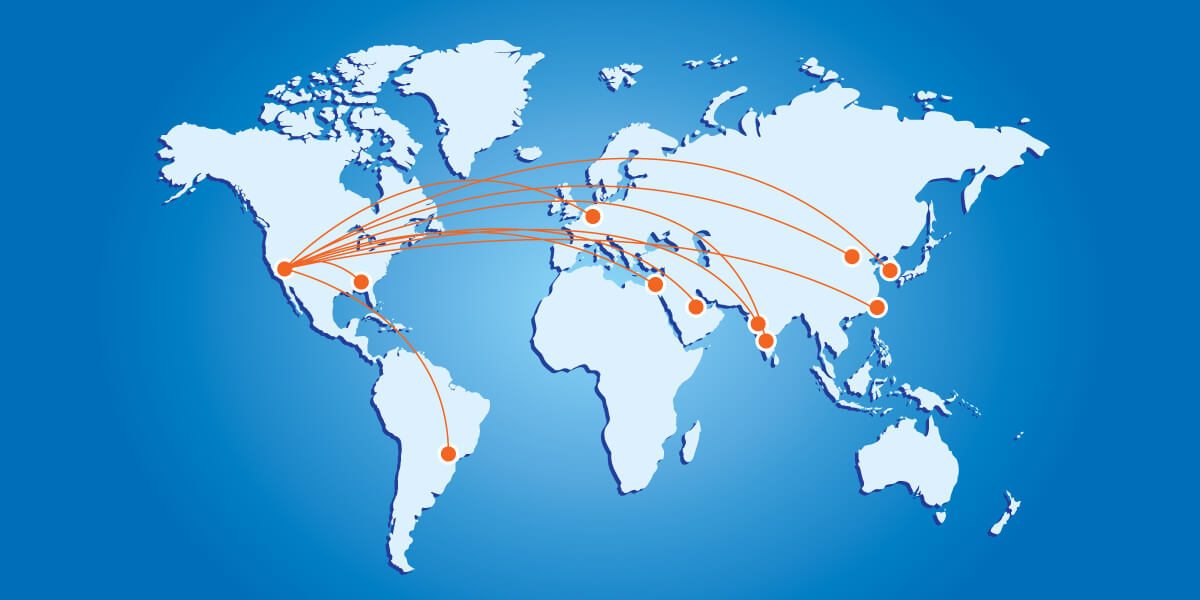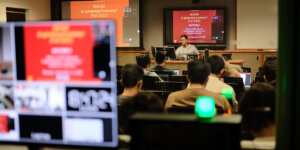
The iPodia Alliance around the World. Artwork / USC Viterbi
This semester, electrical engineering students at the USC Viterbi School of Engineering and electrical engineering students from Jackson State University, a Historically Black College and University in Mississippi, are sharing a classroom.
A cohort of students from USC Viterbi is collaborating via iPodia, a USC Viterbi School of Engineering program that brings together students from different universities irrespective of geographic locations. iPodia was originally developed to share a classroom between USC and overseas universities. This is the first time the program connects USC Engineering students with another US university. In the specific collaboration with Jackson State University, it will also be the first time that the class will involve the design of a physical device.
The partnership was conceived by Dean Yannis C. Yortsos, Dean of the USC Viterbi School of Engineering and Jackson State University Dean Richard A. Aló, Dean of the College of Science, Engineering & Technology.
“We have found iPodia to be a great program for innovation and creative thinking for all students of participating universities. Our new collaboration with Jackson State will be another step forward for the program, as the students will work virtually in the design of a physical device. We are very excited that Jackson State University, an HBCU, is the first HBCU iPodia collaborator with USC Viterbi,” said USC Viterbi Dean Yortsos.
“We are excited that Jackson State Professor Kamal Ali and his engineering students are participating in a global classroom that brings Jackson State University students in collaboration with University of Southern California Viterbi School of Engineering students, and in the future, with other students across the globe to work on resolutions for global societal problems while we celebrate diverse learning environments.” Dean Aló shared.
The students are tasked with creating a navigation device for helping groups of people locate others in their party when pursuing a recreational activity in a wilderness area where there is no cellular or wireless service. Teams will also try to add the ability to send emergency alerts if the device determines that the user has been incapacitated. The students must take into account various factors such as how the user will be able to operate the device in a wide variety of environmental conditions. Teams will be encouraged to add innovative features to their device to make it stand out against competing products on the market.
“This is exciting because it is iPodia’s first foray into a hardware class. Working with teams in distant locations is important for today’s engineers, so we are experimenting with models where students from different locations work together to try to design and build a better hardware prototype for a new application,” said Allan Weber, a computer systems engineer at USC Viterbi who is supervising the collaboration from USC’s end.
Students from both schools will work together by exchanging information about their designs. Both student teams will test different technologies and solutions to the problems they encounter, and then decide one final design. Given the geographic distance, students from both will build devices separately and then will do virtual presentations of their prototypes at the end of the winter semester.
About the iPodia Alliance:
USC’s iPodia Alliance program has been in existence since 2009. It is a consortium among leading higher education institutions worldwide that uses modern distance learning technological platforms to allow students from different universities to enroll in the same class, virtually. In this borderless world-classroom, students attend the same class and work in global teams for homework and projects. Students from the USC Viterbi School of Engineering have shared such a classroom with students from schools such as Technion in Israel, Peking University in China, Korean Advanced Institute of Technology in Korea, Technical University of Aachen in Germany, and BITS University in India, among others.
The iPodia vision is “learning together for a better world”. This vision is based on the three postulates that (1) what you learn depends on with whom you learn, (2) cultural diversity can stimulate global innovation, and (3) collaboration is a necessity in 21st century global education.
About Jackson State University
Jackson State University, founded in 1877, is a historically black, Carnegie Foundation-designated ‘higher research activity institution’ in Jackson, the capital city of Mississippi. The fourth-largest HBCU in the nation with an enrollment approaching 10,000, Jackson State is officially designated as Mississippi’s Urban University and has six campus locations. JSU has been named an Apple Distinguished School (2013-17) for uniquely implementing technology into the curriculum. The university is accredited by the Commission of the Southern Association of Colleges and Schools and offers bachelor’s, master’s, specialist-in-education and doctoral degrees. Challenging minds. Changing lives.
About USC Viterbi School of Engineering
Engineering Studies began at the University of Southern California in 1905. Nearly a century later, the Viterbi School of Engineering received a naming gift in 2004 from alumnus Andrew J. Viterbi, inventor of the Viterbi algorithm now key to cell phone technology and numerous data applications. One of the school’s guiding principles is engineering +, a coined termed by current dean Yannis C. Yortsos, to use the power of engineering to address the world’s greatest challenges. USC Viterbi is ranked among the top graduate programs in the world and enrolls more than 6,500 undergraduate and graduate students taught by 185 tenured and tenure-track faculty, with 73 endowed chairs and professorships.
Published on February 14th, 2017
Last updated on April 24th, 2017










